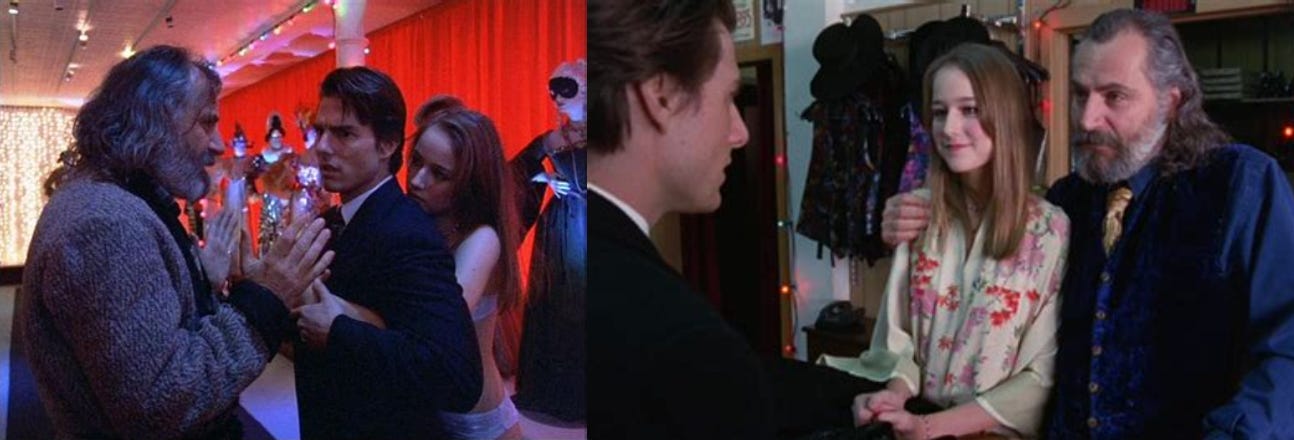Last time on our Artless Kubrick Khristmas special, we got solicited on a street corner with Bill Harford (Tom Cruise). And you know what they say: you wait all night for one solicitation and then two come along. Find out how by reading Rainbow (Fashions).
The proprietor of Rainbow Fashions, a Russian called Milich, is another man anxious about virility, asking Dr. Bill to examine his hair-loss. After cursory advice, Bill has to stop him there: he needs a cloak and mask fast to get to the ball on time.
Milich moodily proceeds with the transaction then halts at a noise from a backroom. There he discovers two Japanese men with clothes off who’ve been consorting with his doll-like, adolescent daughter. Milich locks the men up, warning them he’s calling the police, then tries to beat his daughter up. She scurries behind Bill and whispers what looks like a proposition to him.1
The day after, when Bill comes back to Rainbow Fashions to return the domino cloak, sans mask, the atmosphere has changed: from outraged morals to compromised ones. Seemingly finished with the doctor’s transaction, Milich turns to say a businesslike farewell to the Japanese men from the night before, one of whom even blows a kiss at his daughter. The same daughter whom Milich now insinuates Bill could have under arrangement—father turned pimp.
Barring Bill’s goodbye to his babysat daughter at the start of the film, there’s another ‘father-daughter’ scene that precedes this one with Milich: when Alice danced with the Hungarian lothario Sandor. Grey-haired, worldly wise, Sandor is a “You’re old enough to be my dad!” cliché made real, while in her flirting with him Alice pouts and simpers like a little girl.2 And it’s this father-figure who’s the one to give her a talk on the true purpose of marriage.
The Soviet Russians during their crash-course modernisation of Central Asia tried eradicating, among other backwards customs, the one of bride-price. But on closer examination this custom was not, or not only, a buying-and-selling of women, so argues anthropologist Adrienne Edgar. It was also a rational demand for compensation to a tribe that, in losing a daughter to another tribe, lost their productive edge twice-over: a power to work and a power to make more workers. Such a loss wasn’t symbolic but eminently material in a desert environment where survival margins were so slim.
While a modern man like Bill can hire a sex worker for the night, in order to obtain the lifetime rights to a woman’s productive and reproductive power he once would’ve had to have paid the bride-price. Which is why whenever we speak in modern usage of a father ‘giving away’ his daughter in marriage the redacted second half of that phrase is ‘for free’. Milich pimping out his daughter isn’t a perversion so much as reversion of the marital relationship that Bill benefits from with Alice.
Or, more darkly, that Bill benefits from with his daughter. For he isn’t only a married but a family man; one day he too might give away his daughter.3 But in straying from his own marriage, if only for 24 hours, he’s gotten a franker look than he might’ve liked at marriage’s original, transactional underside. The Soviet Russians couldn’t iron it out of Central Asia; and it still lurks under the costume of civilisation in the hire-shops and family homes of the US.
What does underage-coded Leelee Sobieski whisper to Tom Cruise? According to the script, the pubescently pointed: “You should have a cloak lined with ermine.”
Take when Jenny Diski critiqued a famous come-hither photo of Elizabeth Taylor for how silly sultriness strikes a mature woman like her.
Reading Traumnovelle it’s a wonder Kubrick ever saw any merit in this sickly slice of Viennese kitsch. But the novel has some use throwing Kubrick’s cannier artistic sense into relief. For instance, Bill’s counterpart in it, Fridolin, gets engaged to Albertine (read Alice) when she’s 16 and pregnant; then, on the same holiday on which she crushed on the military officer, he’s surprised and excited on a seaside-walk by a naked teenager—all this before encountering the costumier with his ‘depraved Pierette’ of a young daughter. Maybe Kubrick had already gotten this theme out of his system with his film of Lolita. But I also reckon he wanted to downplay it so as to bring out more neatly the father-daughter theme and remind us Bill too is a dad.





